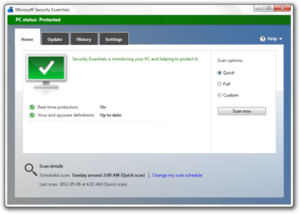Microsoft Security Essentials

Microsoft Security Essentials version 4.0 running on Windows 7
|
|
| Developer(s) | Microsoft |
|---|---|
| Initial release | 29 September 2009 |
| Stable release |
4.10.209.0 / 30 November 2016
|
| Development status | Active |
| Operating system | |
| Platform | IA-32 and x64 |
| Size |
|
| Available in | 33 languages |
|
List of languages
English, Bulgarian, Chinese (Simplified), Chinese (Traditional), Croatian, Czech, Danish, Dutch, Estonian, Finnish, French, German, Greek, Hungarian, Italian, Japanese, Korean, Latvian, Lithuanian, Norwegian, Polish, Portuguese (Brazilian), Portuguese (Portugal), Romanian, Russian, Serbian (Latin), Slovak, Spanish, Swedish, Thai, Turkish, Ukrainian and Vietnamese
|
|
| Type | Antivirus and network intrusion detection system |
| License | Freeware |
| Website | windows |
Microsoft Security Essentials (MSE) is an antivirus software (AV) product that provides protection against different types of malicious software such as computer viruses, spyware, rootkits and Trojan horses. Before version 4.5, MSE ran on Windows XP, Windows Vista and Windows 7, but not on Windows 8 and later, which have built-in AV components. MSE 4.5 and later do not run on Windows XP. The license agreement allows home users and small businesses to install and use the product free of charge. It replaces Windows Live OneCare, a discontinued commercial subscription-based AV service, and the free Windows Defender, which until Windows 8 protected users from only adware and spyware.
Built upon the same virus definitions and scanning engine as other Microsoft antivirus products, MSE provides real-time protection, constantly monitoring activities on the computer and scanning new files as they are downloaded or created and disabling detected threats. It lacks the personal firewall of OneCare or the centralized management features of Forefront Endpoint Protection.
Microsoft's announcement of its own AV software on 18 November 2008 was met with mixed reactions from the AV industry. Symantec, McAfee and Kaspersky Lab—three competing independent software vendors—dismissed it as an unworthy competitor, but AVG Technologies and Avast Software appreciated its potential to expand the consumers' choice of AV software. AVG, McAfee, Sophos and Trend Micro claimed that the integration of the product into Microsoft Windows would be a violation of competition law.
...
Wikipedia
